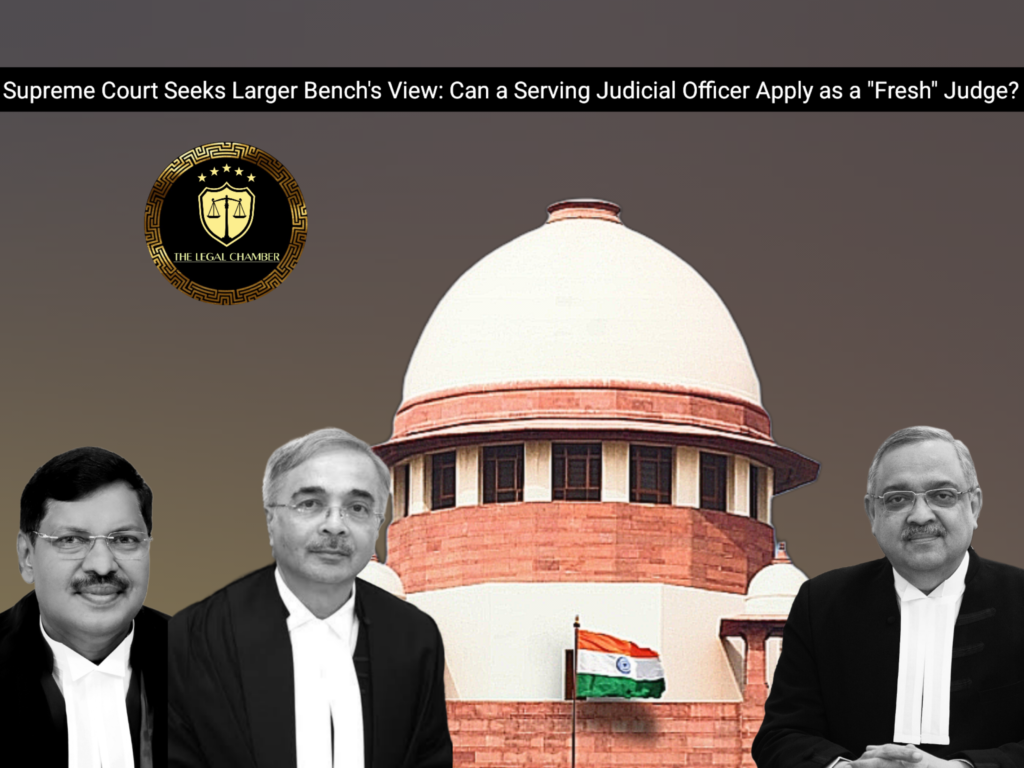
The Supreme Court referred to a 5-Judge Constitution Bench the interpretation of Article 233(2) of the Constitution. It identified two substantial questions of law concerning the eligibility of judicial officers with prior bar experience for direct recruitment as District Judges, and the relevant time for determining such eligibility.
Facts Of The Case:
The present batch of petitions primarily sought a review of the Supreme Court’s 2020 judgment in Dheeraj Mor v. Hon’ble High Court of Delhi. In that decision, a three-judge bench had upheld rules that barred members of the state judicial service from applying for the posts of District Judges reserved for direct recruitment from the bar under Article 233(2) of the Constitution. The review petitioners, along with other connected writ petitions, challenged this ruling. They argued that judicial officers who had themselves been advocates with seven years of experience at the bar before joining the judicial service should be eligible to apply for these “bar quota” posts, contending that the prior judgment misinterpreted the constitutional provision. The central legal dispute was whether the phrase “a person not already in the service” in Article 233(2) prohibits all serving judicial officers from applying, or if it allows those who met the seven-year bar experience criterion prior to their recruitment to be considered. The Supreme Court, acknowledging this involved a substantial question of law regarding the interpretation of the Constitution, directed that the matter must be decided by a larger bench of five judges.
Procedural History:
READ ALSO:Supreme Court Acquits Village Assistant: Merely Accepting Bribe Isn’t Enough
Court Observation:
In its referral order, the Supreme Court made crucial observations regarding jurisdiction and constitutional interpretation. The Court observed that the case involved a substantial question of law pertaining to the interpretation of Article 233(2) of the Constitution, which mandates that such matters must be heard by a bench of at least five judges under Article 145(3). It noted that while the issue had initially been correctly identified for a Constitution Bench in 2018, it was subsequently decided by a three-judge bench in the 2020 Dheeraj Mor judgment, which was procedurally irregular. The Court clarified that the earlier Constitution Bench judgments in Rameshwar Dayal and Chandra Mohan dealt with distinctly different legal issues and thus did not conclusively settle the specific questions now at hand, necessitating a fresh examination by a larger bench.
Final Decision & Judgement:
The Supreme Court did not rule on the merits of the case but made a procedural determination. The final decision was to refer two substantial questions of law regarding the interpretation of Article 233(2) of the Constitution to a five-judge Constitution Bench. The Court directed the Registry to place the matter before the Chief Justice of India on the administrative side for appropriate orders to constitute the larger bench. The judgment mandated that the entire batch of review petitions, writ petitions, and appeals would be heard only after the Constitution Bench decides the referred questions. Consequently, the 2020 judgment in Dheeraj Mor remains operative but its central findings are now subject to potential reconsideration by the larger bench.
Case Details:
Case Title: Rejanish K.V. vs. K. Deepa and Others (along with a batch of connected petitions) Criminal/Civil Appeal No.: Civil Appeal No. 3947 of 2020 Date of Judgement: August 12, 2025 Judges/Justice Name: Justice B.R. Gavai & Justice K. Vinod Chandran, and Justice N.V. Anjaria
Download The Judgement Here